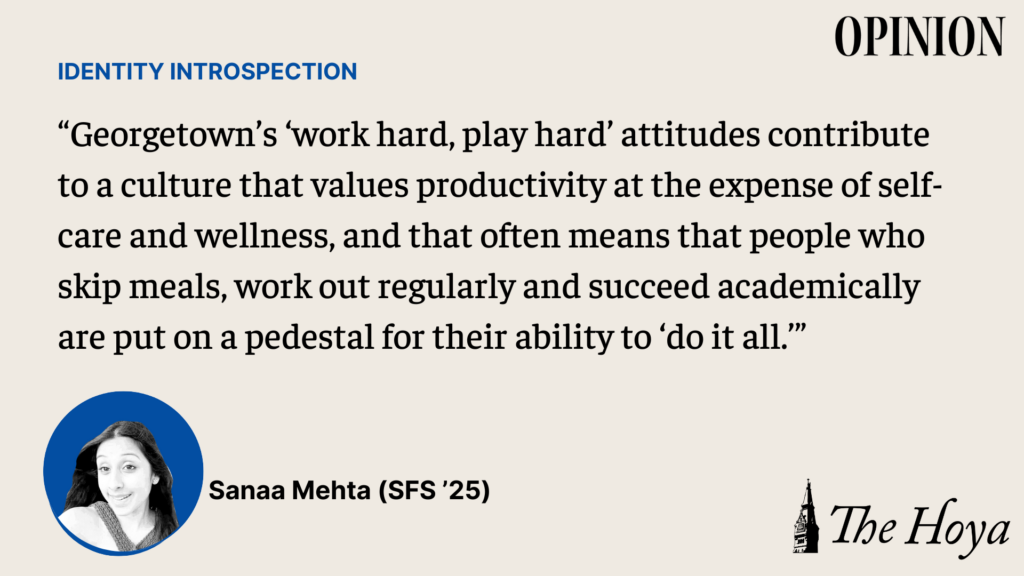CW: This article discusses eating disorders. Please refer to the end of the article for on- and off-campus resources.
“It’s my first meal of the day” is a typical 4 p.m. Georgetown University adage.
The combination of Generation Z’s social media obsession and the recent quarantine era has plagued Georgetown students with body dysmorphia and unnatural eating routines, perpetuating a cycle of negative dialogue around food and self-image.
My arrival at Georgetown and the social pressure to find friends in a new environment heightened my anxieties about body image. For me, at that moment, there were too many active decisions to be made about food, something that used to be a passive part of my schedule.
According to The Emily Program, a specialty health care system for the treatment of eating disorders, exposure to alcohol, living away from home, an abundance of food choices, loss of structure and academic pressure are all risk factors for college students. Mike Gurr, a licensed professional counselor at The Meadows Ranch, an eating disorder recovery center in Arizona, cites that approximately 40% of incoming first-year students already struggle with disordered eating that is then exacerbated by those risk factors.
Living so far from home, the abundance of food choices and the malleable college routine lifestyle pushed me down a rabbit hole of self-consciousness. I found myself saying, “Today is a new day,” every single day, in an attempt to forgive myself and justify having a disorganized schedule the previous day.
On Georgetown’s campus, people often characterize skipping meals as something to be proud of, gloating that they are too busy with clubs, academics and social obligations to find time to eat.
This, however, is a very serious problem that especially impacts women and girls. According to a survey conducted by the National Eating Disorders Association, 35% to 57% of adolescent girls have been reported to diet, fast, purge or take laxatives.
The COVID-19 pandemic brewed a fantasy lifestyle for my high-school self, where I lived in oversized pajamas, sat on Zoom, woke up three minutes before class and snacked in between them. According to the Journal of the American Society of Plastic Surgeons, “Zoom dysmorphia,” a phenomenon in which prolonged time on a web camera and social media has led to an exacerbation in body dysmorphic disorders.
Being in isolation during the pandemic and navigating the social environment during their first year in college has left teenagers dependent on their most convenient form of human interaction: social media. Social media creates a false narrative of “pandemic weight loss” and progress, with posts of diets, edited or angled mirror selfies and workout pictures. These posts display the message that many achieved high intensity goals during their glorified pandemic experience.
Especially in the aftermath of the pandemic, many adolescents’ routines have taken a turn for the worse. When young adults feel lost and out of balance, they tend to turn to toxic habits, seeking the feeling of control, often with food intake.
Last year as a first-year student, triggered by dialogue on weight gain, the “freshman fifteen” and calorie counting, I was stuck in my bed, often feeling obliged to go to the gym at Yates Field House and skip meals. In August 2021, I entered Yates for the first time, and upon my entrance into the girls’ locker room, I was greeted with a massive scale.
I have now spoken to people who have expressed experiences like mine. Little did I know, my peers and neighbors were experiencing similar insecurities and triggers.
Georgetown’s “work hard, play hard” attitudes contribute to a culture that values productivity at the expense of self-care and wellness, and that often means that people who skip meals, work out regularly and succeed academically are put on a pedestal for their ability to “do it all.”
While we normalize conversations on mental health, we should be mindful of what we endorse and the intentionality behind our words. This means not applauding someone for being productive on homework if it comes at the expense of skipping meals to do so.
The stigma to be fit is not simply one that promotes well-being and athleticism, but rather one that comes with serious risks and dangers to healthy eating routines.
Sanaa Mehta is a sophomore in the School of Foreign Service. Identity Introspection is published every third Friday.
Resources: On-campus resources include Health Education Services (202-687-8949) and Counseling and Psychiatric Service (202-687-6985); additional off-campus resources include the National Eating Disorders Helpline (800-931-2237).














